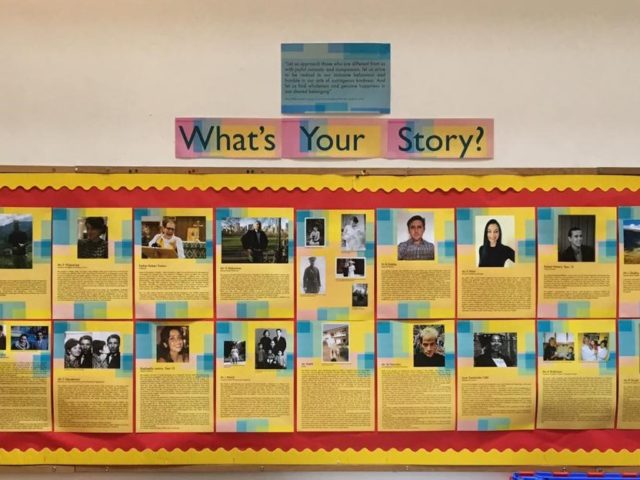‘Can I ask you a cheeky question?’
Thus started a conversation Heads tend to have at this time of year when parents and carers are thinking about schools for their children. I braced myself for the question, wondering what aspect of Highgate’s educational vision was up for scrutiny.
After the utterly friendly and well-rooted inquisition (more on that later), I wondered out loud if what bedevils school choice is a surfeit of love for our children: we’re wired to want the best for them and, faced with choice – local or far-flung, state or independent, co-ed or single-sex, selective or non-selective, faith-based or secular – we worry ourselves to death, and read into the minor variations on London schools seismic differences with earth-shattering consequences.
Does the fact a school, like Highgate, has 39% A* at A level and 70.6% A*/A grades mean that it’s an exam factory? Or does it mean, because there are schools with even higher cumulative scores, that my child is more likely to attain the top grades by going to the school with the very highest grades? Does the fact that a school, like Highgate, has a large entry for maths (59% of all pupils do A level maths) mean that it’s not a school for expressive arts, the creatives? Or does it mean, if my child is already wild about numbers, that s/he’d be better off in a school where almost everyone does maths? Does the fact that there are excellent schools that only take girls mean that only single-sex schools are excellent? Does the fact that Americans and continental Europeans think that single-sex schools are anachronistic mean that we’re contemplating nineteenth century education if we separate girls from boys? Does the fact that a school enters some pupils early for maths GCSE mean that my child will learn more? Or does it mean that they’ll be force-marched through a syllabus they don’t really understand? And how can a prospective parent truly measure the success of a school? By the grades? By the quality of the teaching? By the facilities? By the location? By the effectiveness of the higher education and careers support? By hearsay? By the number of pupils getting into their first choice university? By the extent and effectiveness of its partnerships with local schools? By the co-curricular and community opportunities? By the happiness of the pupils?
Breathless? Befuddled? Of course we are!
So, let’s remember we parents are wired to love our children, and thus prone to anxiety about choices for our children. And let’s realise that school quality is rarely gauged by the analysis of school type or school curriculum. What do we need to know, to understand, if we’re to make a good choice? The good news is that we’re unlikely to be making a bad choice in North London: with all schools in Haringey rated good or excellent by Ofsted and all independent schools thriving, there’s plenty to reassure all of us. The bad news is that this doesn’t help us make a choice: we’re not, after all, going to toss a coin about a choice facing our children.
I suggest dropping the microscope – which enlarges differences which aren’t that great – and reaching for the telescope, and take a look at the young adults we want our children to be:
Let’s imagine them leaving a cohesive community whose members, from many different backgrounds, have learnt to respect, value and exploit the opportunity which emerges from diversity.
They will enjoy life to the full and value their friendships: just as their school will balance their needs as children with their future needs as adults, so will they achieve balance in their lives. They will leave us for places at academically-demanding, selecting universities in the UK and around the world, with the ambition, motivation, skills and staying power to equip them to study independently and with success. In their academic learning as well as in their extra-curricular lives they will have developed the soft skills of communication, collaboration, information-seeking and problem-solving along with qualities of self-awareness, sturdiness and self-confidence. They will have developed their mental as well as their physical health, and will have insight into ways of avoiding, identifying and getting help for ill health, without fear or shame. They will apply for voluntary work, work experience and internships in their school holidays and university vacations and get up-to-date information about employment ahead. The way they have journeyed to their exams, and the understanding that remains with them thereafter, will be as important as their grades. They will be creative, rigorous and eager thinkers and readers who have pursued learning beyond set curricula. They will have had a taste of competition and of the energising effect of entrepreneurship. They will have a good range of hobbies and interests in which they will have participated and performed with enjoyment and commitment. In these, and through service to others, they will have grown as individuals who can lead and can serve. They will be thoughtful and open-minded, conscious of the advantages they have enjoyed and of the opportunities and obligations such advantage should bring.
Sounds good? I think it’s a good formula, and it’s what we use to make up our minds about most things. The journey as children really matters. You don’t have to be one kind of child to be happy here. You should be allowed to navigate your own path to fulfilment, and you’ll need support to liberate yourselves from other people’s preconceptions, but you will need their wisdom and advice. Your gender shouldn’t and won’t determine your choices. You won’t spend seven years on any well-meant parental travellator, but you will be in a school which gives you a taste of excellence, and happiness.
That cheeky question? I’ll leave you to work it out …
Adam Pettitt, 24 January 2018

